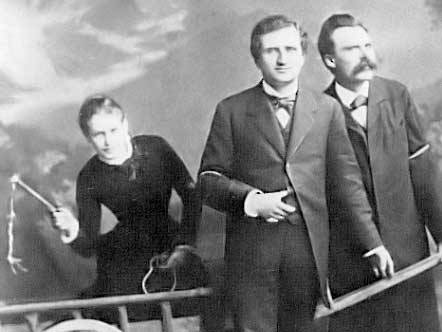Early modern philosopher Francis Bacon opens his “Of Marriage and Single Life” essay this way:
“He that hath wife and children hath given hostages to fortune; for they are impediments to great enterprises, either of virtue or mischief. Certainly, the best works, and of the greatest merit for the public, have proceeded from the unmarried or childless men.”
The great Sir Francis was unmarried and gay, so he counts as a positive case for his thesis. And the list unmarried great thinkers is very long — Locke, Spinoza, Kant … . (Although, given so many great thinkers’ views on love, sex, romance, and marriage, the explanation for their singleness might not be their great-thinker-ness.)

Friedrich Nietzsche agreed with Bacon’s conclusion:
“A married philosopher belongs in comedy”
(Genealogy of Morals 3:7)
Naturally, Friedrich was also unmarried.
But what about the exceptions? Nietzsche for example acknowledges that Socrates the Henpecked was married. Though Nietzsche also thinks Socrates was not much of a philosopher, which — if a correct assessment — proves his point about the dangers of marriage.
* * *
Update: The above is a humorous, un-serious hypothesis — an example of philosophers exaggerating a grain of truth (that there can be a tension between needs of career and needs of family, as both require huge amounts of time and other resources). But there is that grain of truth, illustrated by this additional off-the-top-of-my-head listing of other philosophers:
Married: Aristotle, Hegel, Marx, Mill, Dewey, Heidegger, Rand, Popper …
Unmarried: Plato, Augustine, Aquinas, Galileo (though he had three children with his mistress Marina Gamba), Descartes, Leibniz, Hume, Smith, Rousseau (five children, though), Schopenhauer, Kierkegaard, Wittgenstein, Sartre …

Interesting. There are some curious anomalies, though. These are allegations, as far as I know. 1. Descartes had a child out of wedlock. 2. Kant had an affair with a woman whose military husband was out on deployment. I recall that the evidence for this is some saucy correspondence. 3. Aristotle was happily married and wanted to be buried next to his wife. See his will. He also wanted to make sure that his daughter was taken care of and a suitable husband for her be found (Theophrastus, if he chose?).
You get some corroboration to the philosophers you mentioned from Socrates, whose exhortation in the Phaedo to have his sobbing wife (Xanthippe) and children taken away is well known, as Socrates was about to be executed. 🙂
Having children is the real question I would say. Your ambition with work can be envigorated through a good marriage however it will be inevitably stifled should you have children and also hope to be a good father. One speaks of ‘sacrifices’ in parenthood all the time, your individual pursuit is largely the cost of children.
I should like some sources or providence for Kant’s liason if you are able, as I had never heard this about the great thinker
Thank you,
Michael
Hey, I completely agree with you on the point that having a child would seriously interfere with your individual interests. Although I’m really curious as to what you meant by “your ambition with work can be envigorated through a good marriage”. I was wondering if you could explain why you think that about marriage, and what would be the positive effect or an example, of how a good marriage could bring such a thing about?
Wow… I didn’t know about Aristotle’s happy marriage.
Thanks for this
Francis Bacon was married to Alice Barnham